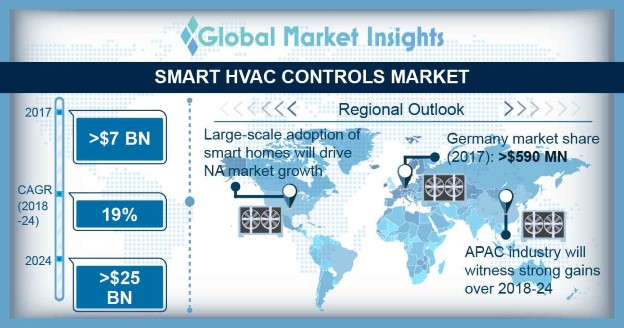Home > Industrial Machinery > HVAC > Smart HVAC Controls Market
Smart HVAC Controls Market Size
- Report ID: GMI710
- Published Date: Nov 2018
- Report Format: PDF
Smart HVAC Controls Market Size
Smart HVAC Controls Market size was over USD 7 billion in 2017, growing at a CAGR of 19% from 2018 - 2024. The global shipments are expected to surpass 250 million units by 2024.

Smart HVAC controls market growth is expected to grow over the next six years due to the rapid penetration of Internet of Things (IoT). Manufacturers are integrating HVAC systems with IoT technology. Manufacturers are programming the systems to work in real-time with the other connected systems such as powered window shades and door locks. The increasing M2M connectivity is encouraging users to use intelligent systems in HVAC units. Moreover, the companies are using components including sensors to collect real-time information and monitor indoor environmental conditions to enhance the user experience. These devices also use the already installed components in smart homes to collect information. Growing use of the intelligent sensor technology will propel the demand for the HVAC controls market during the forecast timespan.
Energy management initiatives by the governments in light to environmental degradation are expected to propel the smart HVAC controls market growth. In several countries, regulations have been put in place to ensure that buildings have smart heating & cooling systems to improve their energy efficiency. For instance, the European Union has passed a directive, which states that all new buildings must be nearly zero energy buildings by December 2020 and December 2018 is the deadline for public buildings. Conventional buildings show high inefficiency as they emit considerable amounts of CO2, leading to climatic changes. According to a study conducted by the American Council for an Energy Efficient Economy, the use of smart HVAC allows the saving of energy costs of about 5% to 15%.
| Report Attribute | Details |
|---|---|
| Base Year: | 2017 |
| Smart HVAC Controls Market Size in 2017: | 7 Billion (USD) |
| Forecast Period: | 2018 to 2024 |
| Forecast Period 2018 to 2024 CAGR: | 19% |
| 2024 Value Projection: | 25 Billion (USD) |
| Historical Data for: | 2013 to 2017 |
| No. of Pages: | 300 |
| Tables, Charts & Figures: | 317 |
| Segments covered: | Products, Application and Region |
| Growth Drivers: |
|
| Pitfalls & Challenges: |
|
Lack of awareness regarding the benefits, low energy costs, and substitutions from wired to wireless sensor network may hamper the smart HVAC controls market growth. The initial installation costs of these systems are high and discourage small users from installing these systems. Furthermore, the complexity involved in retrofits of existing buildings and the lack of product differentiations due to heavy investments are among the challenges faced by industry participants.
